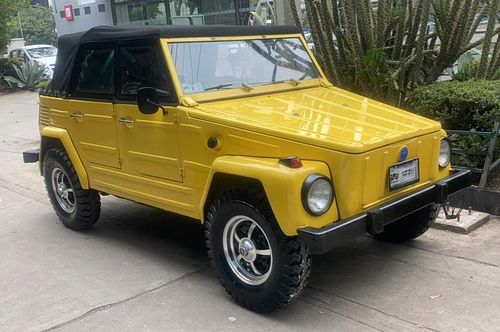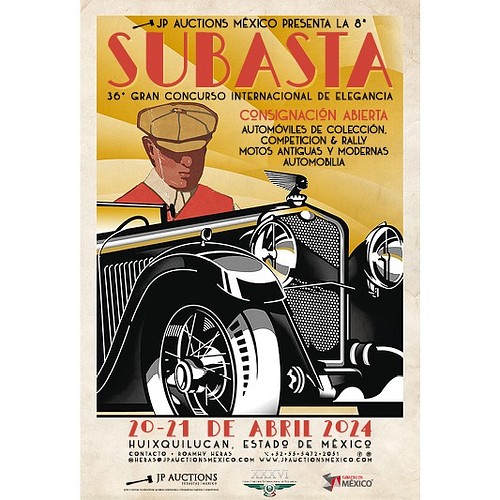Volkswagen Safari - 1972
Two ways to bid:
- Leave a max absentee bid and the platform will bid on your behalf up to your maximum bid during the live auction.
- Bid live during the auction and your bids will be submitted real-time to the auctioneer.
Bid Increments
| Price | Bid Increment |
|---|---|
| MXN$500 | MXN$50 |
| MXN$1,000 | MXN$100 |
| MXN$5,000 | MXN$500 |
| MXN$10,000 | MXN$1,000 |
| MXN$50,000 | MXN$5,000 |
| MXN$100,000 | MXN$10,000 |
| MXN$500,000 | MXN$50,000 |
| MXN$1,000,000 | MXN$100,000 |
About Auction
Apr 21, 2024
JP Auctions Mexico heras@jpauctionsmexico.com
- Lot Description
El Volkswagen Safari de 1972, también conocido como Volkswagen Type 181 o “The Thing”, era un vehículo derivado del popular Volkswagen Beetle. Combinaba la robustez y confiabilidad del vocho con una carrocería familiar y mayor capacidad todoterreno.
Exterior:
Compartía la mecánica y el chasis del escarabajo, pero con una carrocería completamente nueva.
Diseño familiar de cuatro puertas, con una carrocería alargada y un techo elevado para mayor espacio interior.
Parabrisas delantero abatible para mejorar la ventilación en climas cálidos.
Llantas de aluminio con neumáticos de tacos para mayor agarre en terrenos difíciles.
Parachoques delanteros y traseros de color negro.
Interior:
Con capacidad para cinco pasajeros y espacio de carga adicional detrás de los asientos traseros.
Asientos delanteros individuales y traseros abatibles para aumentar la capacidad de carga.
Tablero similar al del escarabajo, con instrumentos analógicos y controles básicos.
Volante de dos radios, clásico.
El equipamiento incluía asientos de tela y techo corredizo de lona.
Motor y Rendimiento:
Un motor bóxer de cuatro cilindros refrigerado por aire de 1.6 litros, con 50hp.
Transmisión manual de 4 velocidades.
Tracción trasera.
Rendimiento moderado, con una velocidad máxima de aproximadamente 130 km/h.
Un todoterreno versátil:
La Volkswagen Safari de 1972 era una opción atractiva para aquellos que buscaban un vehículo versátil, capaz de circular por la ciudad y también por terrenos difíciles. Su diseño familiar, su robustez y su precio accesible la convirtieron en un vehículo popular en Europa y América Latina.
Puntos adicionales:
El Volkswagen Safari de 1972 se fabricó en Alemania y Brasil.
Se dejó de producir en 1980, pero sigue siendo un clásico codiciado por los entusiastas de Volkswagen. Y en su color actual, todo mundo lo quiere! Este baby tiene suerte de no estar en Europa, hoy en dia en la Costa Azul se los arrancan a precios exorbitantes !
- Provenance
Coleccion privada
- Shipping Info
-
COLLECTION, REMOVAL AND STORAGE
Following the Auction, Buyers must remove all Lots from the Auction site.
Buyers must provide their own packing materials and their own assistants for the removal of lots.
If not removed timely by Buyer, in addition to any and all other remedies and rights JP AUCTIONS may have, JP AUCTIONS shall have the right to remove any Lot at Buyer’s sole risk and expense and store it, at Buyer’s expense, including removal, storage, transportation and handling expenses and costs and applicable taxes, at a third-party warehouse, and Buyer hereby grants JP AUCTIONS an irrevocable power of attorney to remove and store such Lots at Buyer’s expense.Items not collected within 2 days of the Auction will be charged per lot per day, as follow:
-Classic Cars and Motorcycles: 3000 MXN (+ 16% VAT)
-Memorabilia : 500 MXN (+ 16% VAT)
For international bidders, please contact JP AUCTIONS regarding your specific needs of collection, removal, storage and delivery. We would be delighted to help you in this process.
EXPORT PERMITS
The Buyer is responsible for determining whether or not an export permit is required to export a Lot and for obtaining and paying the costs of any permits or licenses necessary to export any Lot from MEXICO or any other country where it is registered and/or import it into any other country, and for the payment of any import duty that may be levied by the country of import. JP AUCTIONS makes no representation or warranty of any kind with regard to whether or not any Lot can be exported or imported or the issuance of an export or import permit for any Lot.
-
- Buyer's Premium



 EUR
EUR CAD
CAD AUD
AUD GBP
GBP MXN
MXN HKD
HKD CNY
CNY MYR
MYR SEK
SEK SGD
SGD CHF
CHF THB
THB








